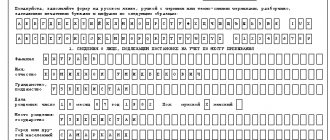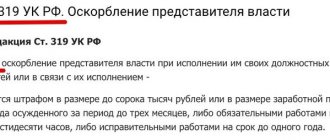Every foreign citizen who arrives in Russia must register at his place of residence or place of residence. To do this, you need to contact the migration authorities in person or through the receiving party. This procedure is not particularly difficult. For lack of registration under Article 322.2 of the Criminal Code of the Russian Federation in 2022, criminal liability is provided.
Form notification of the arrival of a foreigner in Russia
To register, it is enough to make copies of the documents with which the foreigner arrived in the Russian Federation and send them to the Federal Migration Service along with the notification of arrival. Notification of the arrival of a foreign citizen in the Russian Federation can be downloaded here.
However, even here there are many violations, and one of them is fictitious registration of foreign citizens. The detailed text of Article 322.2 of the Criminal Code of the Russian Federation can be found here.
Amount of fine and possibility of criminal prosecution
Criminal liability for fictitious registration is established in paragraph 2 of Article 322 of the Criminal Code. This norm establishes the following types of sanctions for those responsible:
Punishment in the form of a fine, which can range from 100,000 to 500,000 rubles.
- The same article of the Criminal Code provides for the recovery from the offender of his earnings or other income for the last 3 years as punishment.
- Violators can also be sentenced to forced labor for up to three years. In addition, he may be prohibited from holding any positions or engaging in certain types of activities.
- The most severe type of punishment is imprisonment. Its maximum term can be three years.
However, this article of the Criminal Code contains a note. It states that a person can be released from prosecution if they help solve the crime. True, his actions should not contain another crime.
Arbitrage practice
The Vorkuta City Court of the Komi Republic accepted for consideration an appeal from a citizen who had previously been found guilty of fictitious registration of six foreign citizens and received a criminal penalty in the form of 150,000 rubles with payment in installments for 30 months of 5,000 monthly.
In the appeal, the representative of the convicted person presented arguments that indicated that the actions should be qualified not as six separate acts, but as one process ongoing over time. He managed to prove this fact and even reduce the number of fictitiously registered ones; he provided indisputable information that one of them still cannot qualify in this way.
The appellate instance took into account the evidence presented and overturned the decision of the first court hearing, awarding the convicted person a fine of 120,000 with installments over two years of 5,000 monthly. The reclassification of the act from criminal to administrative was denied.
Appeal ruling dated November 15, 2022 in case No. 10-58/2017
- Look
Why are there difficulties with registration?
Registration at the place of residence can be either permanent or temporary. As a rule, foreign citizens receive registration of the second type. Its duration depends on the purposes and for how long the traveler from abroad arrived in Russia.
The minimum period for temporary registration is a month (although it happens that a guest asks to register for only a few days), and the maximum is limited to five years.
When a foreigner stays at a hotel or the inviting company handles his migration registration, problems usually do not arise. If a foreign citizen is staying with private individuals, they often refuse to register him at his place of residence.
This can be caused by various reasons. It's no secret how often real estate scams occur, and people are simply afraid: of becoming victims of fraud.
Some people simply don’t want the extra hassle, because the homeowner will have to go with the migrant to the Federal Migration Service and be present when submitting the application.
The application for a temporary residence permit can be downloaded on our website.
In such a situation, a foreign citizen begins to look for alternative options. And if there is demand, there will be supply: especially clever Russians began to offer such a service as fictitious registration of a foreign citizen. For the time being, no one thinks about punishment, however, if the deception is revealed, very severe penalties will follow.
Legal regulation
Registration standards are regulated by several legislative acts. Some of the most important documents that prescribe the procedure for registration and deregistration are:
- Administrative regulations approved by Order of the Ministry of Internal Affairs of Russia No. 984 of December 31, 2022.
- Law of the Russian Federation No. 5242-1 of June 25, 1993
- Decree of the Government of the Russian Federation No. 713 of July 17, 1995
All these legal acts clearly regulate the registration process, which involves temporary stay or permanent residence. Violation of these norms entails administrative and even criminal liability.
If we talk specifically about the concept of fictitious registration, then it is provided for in Article 322.2 of the Criminal Code of the Russian Federation. Changes to it were made by Federal Law No. 376-FZ of December 21, 2013, which was popularly dubbed the “law on rubber apartments.” The article of the Criminal Code of the Russian Federation reveals the very meaning of the concept of fictitiousness, and also provides for a gradation of responsibility that can be applied in a particular case. Article 322.3 of the Criminal Code of the Russian Federation prescribes the level of responsibility applicable to persons who do not comply with the rules for registering foreign citizens.
Which registration is fictitious
Regular registration takes a minimum of time and poses virtually no threat to the homeowner. It consists in the fact that both the owner of the property and the foreigner must appear together at the migration authorities.
The first one must have a passport and a document confirming the right of ownership of the property. The foreigner presents an identity card and a migration card.
This is what a registration stamp looks like in the Russian Federation
The owner of the living space submits a corresponding application to the GUVM, and his guest receives a temporary registration stamp. At this point the procedure is considered complete. If it is followed correctly, a foreign citizen can apply for a labor patent. In this case, the place in which the migrant lives and his registration address must be identical.
If the owner does not want to register a new tenant, it is worth remembering that fictitious registration of a foreign citizen at the place of residence is subject to not only administrative, but also criminal liability.
In such cases, it is better not to take risks and look for other housing, the owners of which will be more accommodating.
But first you should try to convince the owner that temporarily registering another person in your living space does not threaten him with anything. At the end of its validity period, there is no need to go anywhere; the foreigner will be deregistered automatically.
By submitting an application, the owner simply notifies the migration authorities that other people are temporarily registered in his apartment.
The following cases fall under the concept of fictitious registration:
- When a person knowingly provides false information or fake documents.
- When a foreigner registered at his place of stay, the owner of the premises did not intend to provide him with his housing.
- If a migrant registered at his place of stay, although he knew that he would not live there.
For fictitious registration of foreign citizens, the fine is from 100,000 to 500,000 rubles.
Punishment for fictitious registration of foreign citizens in this case is borne by both: the migrant and the one who registered him. An official who allowed a fictitious registration will not be able to avoid it either, if it is established that this happened intentionally.
The Supreme Court has prepared clarifications on criminal cases of illegal migration to the Russian Federation
On June 23, the Plenum of the Supreme Court considered the draft resolution “On judicial practice in cases of illegal crossing of the State Border of the Russian Federation and crimes related to illegal migration”; based on the results of the online meeting, the document was sent for revision.
In his report, Supreme Court Judge Oleg Borisov noted that the relevance of such a document is confirmed by judicial statistics, according to which the number of persons convicted of relevant migration crimes is significant.
Director of the Presumption CA Philipp Shishov noted that the upcoming resolution is intended to summarize judicial practice in criminal cases, which began to take shape more than 15 years ago - with the introduction of an article on the organization of illegal migration into the Criminal Code in 2004, followed by the introduction of criminal liability for fictitious registration at the place of stay and residence and other crimes in the field of illegal migration. “Having migrated from the Code of Administrative Offenses to the Criminal Code of the Russian Federation, this act raised a wave of criminal cases initiated against the “inviting party” in the person of apartment owners and legal entities-employers. It is known that multi-episode criminal cases have been initiated in Russia, when the owners of so-called “rubber” apartments simultaneously register hundreds or even thousands of temporary guests,” he noted.
What should be considered illegal entry into the Russian Federation?
Paragraph 1 of the document draws the attention of the courts to the need when considering criminal cases of crimes under Art. 322 (Illegal crossing of the state border of the Russian Federation), 322.1 (Organization of illegal migration), 322.2 (Fictitious registration of a citizen of the Russian Federation at the place of stay/residence in housing, a foreign citizen or stateless person at the place of residence in Russian housing), 322.3 (Fictitious registration of a foreigner or a stateless person at the place of stay in the Russian Federation) of the Criminal Code, take into account the requirements of Russian legislation regulating the rules for crossing the State Border of the Russian Federation, entering Russia and passing through its territory, staying in the Russian Federation and leaving it.
“This clarification is necessary in connection with the blanket nature of criminal law, when applied in a sentence or other court decision in a criminal case, specific articles of legislative or other regulations, the requirements of which were violated during the commission of a crime, must be taken into account,” Oleg Borisov emphasized.
Clause 2 of the draft explains what should be understood as valid documents for the right to enter or leave the Russian Federation in accordance with Part 1 of Art. 322 of the Criminal Code of the Russian Federation. As follows from paragraph 3 of the document, crossing the state border of the Russian Federation without valid documents for the right to enter or leave Russia should be classified as a person passing through border control using deliberately forged (forged) documents or using genuine documents of another person.
Based on clause 4, provided for in Art. 322 of the Criminal Code, crimes are recognized as completed from the moment a person actually crosses the state border line, regardless of the place and method of crossing it (on foot, on any type of transport, secretly or openly, with or without passing through border control at a state border checkpoint). The next paragraph of the document notes that the above crimes can only be committed with direct intent, in which the perpetrator is aware of the fact of crossing the state border in violation of established requirements.
Clause 6 of the draft explains what circumstances should be established by the court to qualify an act under Part 2 of Art. 322 of the Criminal Code of the Russian Federation. In particular, the court must establish that the foreigner or stateless person was aware that entry into the Russian Federation was not permitted to him on legal grounds. According to paragraph 7, if the perpetrator illegally crossed the state border of the Russian Federation two or more times under circumstances indicating that he had a single intent to carry out such actions, the act does not form a set of crimes and is qualified under the relevant part of Art. 322 of the Criminal Code of the Russian Federation as one crime.
In accordance with paragraph 8 of the document, violation of the rules for crossing the state border does not constitute a crime under Part 1 of Art. 322 of the Criminal Code of the Russian Federation, if it was committed by a person who has valid documents for the right to enter/exit the Russian Federation and the appropriate permission obtained in the manner prescribed by Russian legislation. It is noted that the corpus delicti provided for in Part 2 of Art. 322 of the Criminal Code of the Russian Federation, is absent in cases where entry into the Russian Federation in violation of these rules was made by a foreigner or stateless person, in respect of whom there is no prohibition by the Russian authorities on the entry of such persons into the Russian Federation on legal grounds. It is also emphasized that a violation of the rules for crossing the state border does not include forced crossing due to emergency circumstances (for example, due to an accident, breakdown, natural disaster that threatens the safety of the vessel).
Organization of illegal migration
Paragraph 9 of the document explains what is meant by the organization of illegal migration in accordance with Art. 322.1 of the Criminal Code of the Russian Federation. Such a crime is qualified as completed from the moment the guilty person deliberately creates conditions for the implementation of at least one of the relevant illegal actions, regardless of whether such actions have been committed or not. At the same time, the qualification of the act does not depend on whether the foreigners or stateless persons in whose interests it was committed were brought to justice (in particular, for the reason that these persons left Russia).
The next paragraph notes that if the organization of illegal migration, along with other actions of an organizational nature, includes the commission of fictitious registration (registration) of foreigners or stateless persons at the place of residence (place of stay) in Russia, the act is subject to qualification according to the totality of crimes provided for in the relevant part of Art. . 322.1, 322.2 or 322.3 of the Criminal Code of the Russian Federation. Oleg Borisov noted that this paragraph is aimed at preventing double liability for organizing the illegal stay of foreigners and stateless persons in the Russian Federation, which consists solely of fictitious registration of such persons or registration at the place of residence/stay. In such cases, he noted, the act is qualified only according to one element of the crime.
If the criminal actions consisted only of fictitious registration (registration) of the above-mentioned persons at their place of residence (place of stay) in order to create conditions for the latter’s illegal stay in Russia, the act is qualified under Art. 322.2 or 322.3 of the Criminal Code of the Russian Federation and does not require additional qualifications under Art. 322.1 of the Code.
In paragraph 11 of the draft it is explained that the creation with a single intent of conditions for the implementation by a foreign person or stateless person of several specified in Part 1 of Art. 322.1 of the Criminal Code of the Russian Federation, violations of migration legislation, as well as for the commission of one or more such illegal actions simultaneously by two or more foreigners or stateless persons should be qualified as one crime provided for in the relevant part of Art. 322.1 of the Criminal Code of the Russian Federation.
Clause 12 of the document explains which act should be qualified under clause “b” of Part 2 of Art. 322.1 of the Criminal Code of the Russian Federation. The next paragraph states that if a person organized the illegal entry of foreigners or stateless persons into the territory of the Russian Federation by illegally crossing the Russian state border, what he did is covered by the relevant part of Art. 322.1 of the Criminal Code of the Russian Federation, but does not require additional qualifications under Part 3 of Art. 33 and art. 322 of the Code. When a person who organized illegal migration, while committing this crime, himself illegally crossed the Russian border (for example, as a guide), then, if there are grounds, his actions are qualified according to the totality of crimes provided for in Art. 322 and 322.1 of the Criminal Code of the Russian Federation.
According to the lawyer of the AP MO Victoria Shevtsova, at present the courts are extremely formal in their approach to considering this category of cases. At the same time, the plot of criminal cases under Art. 322.1 of the Criminal Code is unifying in nature for all actions that can be attributed to the organization of illegal migration. This is a search for clients from among foreign citizens who need entry into the Russian Federation and a long stay in it; organization of fictitious legal entities in order to legalize the stay of the above persons in the Russian Federation; provision of deliberately false documents to the authorized bodies of the Ministry of Internal Affairs of Russia; receiving material remuneration in the form of money for illegally issuing invitations to foreign citizens to enter and stay in the territory of the Russian Federation, as well as their illegal registration with migration authorities in the territory of the Russian Federation; fictitious migration registration
Fictitious registration or registration at the place of stay
From paragraph 14 it follows that the courts, when considering crimes under Art. 322.2 and 322.3 of the Criminal Code of the Russian Federation, must take into account the content of the concepts of place of residence and place of stay, fictitious registration (registration), as well as other provisions of domestic legislation on the right of citizens of the Russian Federation to freedom of movement, migration registration of foreigners and stateless persons.
Paragraph 15 of the document describes in detail the corpus delicti under Art. 322.2 and 322.3 of the Criminal Code. In paragraph 16, the attention of the courts is drawn to the fact that for committing a crime under Art. 322.2 of the Criminal Code of the Russian Federation, responsibility lies with the owner or tenant of the relevant housing, who submitted information or documents to the registration (migration) registration authority for fictitious registration at a specific address. It is also noted that the subject of the crime under Art. 322.3, is the owner or tenant of housing, director or other authorized employee of an organization in which a foreigner or stateless person does not carry out labor or other legal activities, who has submitted information or documents to the registration (migration) registration authority for the fictitious registration of such a person at the place of residence.
Victoria Shevtsova agreed with such explanations, but noted that they do not address the point of what should be expressed as criminal intent and the person’s awareness that his actions are illegal or may cause harm to the Russian Federation. “Often, investigations and courts when considering cases do not establish the fact of awareness of the illegality of the actions of a Russian citizen who registered a foreigner at his place of residence for migration registration. Divisions of the Ministry of Internal Affairs and the MFC that carry out migration registration are required to explain the consequences of such actions, as well as the possible timing of registration, since law enforcement agencies sometimes abuse their rights and hold accountable citizens who decide, for example, to register workers repair or housekeeping work. In such cases, law enforcement officers classify the intent as aimed at fictitious residence for the purpose of making a profit, ignoring, in particular, the fact that foreign citizens completed the work and left,” she noted.
If the employee of the registration (migration) registration body, who recorded the submitted information about the place of residence or place of stay of a citizen of the Russian Federation, a foreigner or a stateless person, was knowingly aware of the fictitiousness of such registration (registration), he is responsible for co-perpetration in the crime provided for in Art. 322.2 or 322.3 of the Criminal Code of the Russian Federation. Such crimes, as noted in paragraph 17 of the draft, can only be committed with direct intent. If the common intention of the guilty person was to carry out fictitious registration (registration) at the same place of residence or place of stay of two or more citizens of the Russian Federation, foreigners or stateless persons at the same time, what he did constitutes one crime.
According to paragraph 18 of the document, the release of a person from criminal liability for committing a crime on the basis of the notes to these articles does not prevent criminal prosecution for other illegal actions committed if they are subject to independent qualification (for example, for organizing illegal migration, falsifying a citizen’s passport for the purpose of use). Oleg Borisov pointed out the advisability of expanding the notes to Art. 322.2 and 322.3 based on the courts’ different understanding of facilitating the detection of a crime as a basis for exemption from criminal liability. “This proposal requires detailed discussion,” he emphasized.
In paragraph 19 of the draft it is noted that in the legal assessment of actions without aggravating circumstances related to the organization of illegal migration under Part 2 of Art. 322.1 of the Criminal Code of the Russian Federation or with the implementation of fictitious registration, courts must take into account the provisions of Part 2 of Art. 14 of the Criminal Code that an action (inaction), although formally containing signs of any act provided for by criminal law, but due to its insignificance does not pose a public danger, is not a crime.
Philip Shishov called this recommendation interesting. “In this case, we are most likely talking about a single fictitious registration or a similar one-episode crime,” he suggested.
In paragraph 20 of the document, courts are recommended, when considering criminal cases of crimes related to illegal crossing of the State Border of the Russian Federation and (or) illegal migration, to identify the circumstances that contributed to their commission; violations of the rights and freedoms of citizens; other violations of the law committed during the preliminary investigation or during the consideration of a criminal case by a lower authority, about which it is necessary to issue private rulings (decisions) to the relevant organizations and officials.
Victoria Shevtsova believes that the explanations of the Plenum of the RF Armed Forces do not reflect very important points that the courts should establish during the consideration of such cases. “This is the place and time of the commission of a crime, as well as the moment in which state bodies, when registering for migration or issuing invitations to enter the territory of the Russian Federation, issue documents of the established form, without checking the validity of issuing these documents, if this is directly their responsibility. It is important to eliminate this gap in the legislation that exists today,” the expert is convinced.
Penalties for fictitious registration
Despite the strict punishment, thousands of such cases are observed in Russia every year. It is reckless to hope that they won’t get caught: unlike some other government agencies, Russian migration authorities work perfectly.
Employees often conduct raids, and neighbors often report the possible presence of illegal residents.
In identifying illegal immigrants, they have the right to use a variety of measures: checking against registration databases, requesting documents on rental housing, interviewing all suspects, as well as forensic examination of documents.
All this makes it possible to identify the fictitiousness of registration, if it took place. So before you decide to take such a risky step, you need to know what the risks are.
How is the verification process carried out?
Only a judicial authority has the right to recognize a registration as fictitious. The basis for opening a case is a statement from an employee of the Migration Service or a local police commissioner. But often the initiators are vigilant neighbors. After reviewing the application, the FMS employee performs the following actions:
- checks the actual stay of the migrant at his place of registration;
- finds out how many citizens are actually registered in a residential area using the all-Russian database;
- asks neighbors about the actual residence of these citizens, checks their place of work;
- checks registration documents;
- if necessary, interviews all persons living in the premises.
If a FMS employee suspects that a foreign citizen has provided false documentation or false information during registration, then a request is sent to the internal affairs bodies of the Russian Federation to clarify and verify the authenticity of the information. Next, an investigation is carried out, and either the case is sent to court, or if there is no evidence of a crime, the investigation is terminated. This is how the migrant’s documents are checked.
How to check if the registration procedure has been followed
Despite the large number of violations, there are a lot of conscientious foreign citizens living in Russia. Often people are interested in how to check whether the registration is fictitious and whether the guest is registered at all.
The best way to avoid trouble is not to contact various fly-by-night companies that advertise on the Internet with offers to quickly obtain temporary or even permanent registration.
There are a huge number of cases where people who are already in a difficult situation have lost their last money due to such extortionists. The employer, hotel administration or owner of the accommodation where the foreign guest is staying must register.
Certificate of temporary registration
In this case, the migrant must be given a certificate of temporary registration, which specifies its validity period. If you still have doubts, you need to ask to know which department of the Main Directorate for Migration Affairs the representatives of the receiving party contacted.
Of course, officials will not provide such information over the phone, but it’s worth taking a little time and going there in person. Since many issues are now resolved through the MFC and the State Services portal, the queues at migration departments have become much shorter.
What threatens those who do not live according to registration?
Since in Russia, unlike many other countries, there is an institution of registration, the law has a negative attitude towards situations when one of the citizens does not live at the place of registration, but is, for example, in another city. However, such cases are not uncommon, and it is impossible to track them all.
Officially, a fine of 2,000 rubles is imposed for living outside your registration.
Moreover, this can be quite difficult to prove. If you don’t come into conflict with the local police officer or scandalous neighbors, you can live like this for years (meanwhile, the officially permitted period of residence without registration is limited to 3 months).
However, this causes certain inconvenience to the resident.
Without a permanent residence permit, it is difficult to get a normal job; without it, you will not be able to obtain a Taxpayer Identification Number (TIN), register an individual entrepreneur, or enroll your child in school.
In addition, if the violation is discovered, you will have to pay an administrative fine of 2,000 to 3,000 rubles. In the capital, fines will be even higher.
Features of the application of punishment
The article of the Criminal Code, which provides punishment for fictitious registration, is often used, however, imprisonment is still considered a last resort. In addition, there are no established rules regarding who should serve such a sentence - the migrant or the homeowner.
Most often, the owners have to answer, but first law enforcement agencies must prove that the person intentionally violated the law.
It should not be surprising that the Criminal Code establishes such strict standards. In the practice of law enforcement agencies, there have been many cases where migrants have committed offenses and even crimes.
If they do not live at their place of registration, their search can take a very long time. So, in many ways, strictness towards those responsible for fictitious registration is a necessary security measure.
For this reason, one should not expect a weakening of liability for such offenders. Foreign citizens in such cases face heavy fines and deportation from the country. In addition, a ban on entry into Russia may be imposed for a certain number of years.
Identification of violations
It is quite difficult to detect the fact of a violation.
It is considered common practice that the disclosure of one crime automatically provides information about the fictitious presence of citizens involved in it or who are witnesses in this case. Most of these violations are revealed due to the caring attitude of other citizens, who signal the presence of fictitiousness.
Another approach is also practiced when territorial bodies of the Ministry of Internal Affairs provide information about residential premises where quite a lot of people are registered, especially if they are not related to the owner. Law enforcement agencies verify information, which may result in violations being identified.







